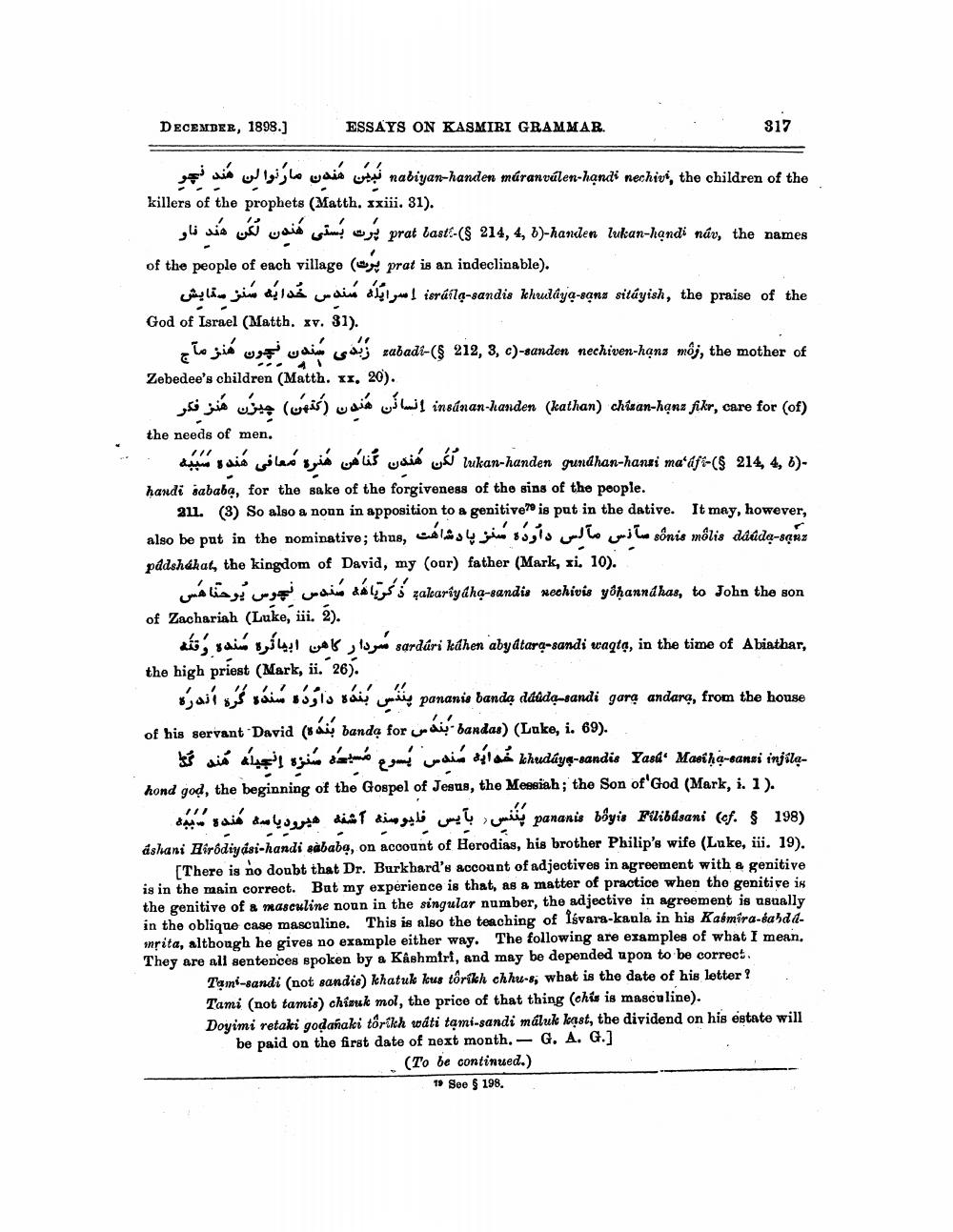________________
DECEMBER, 1898.]
ESSAYS ON KASMIRI GRAMMAR
317
yo sio wisho walio www nadiyan-handen máranválen-hạndi nechiv', the children of the killers of the prophets (Matth. sxiii. 31).
gli sís wai wais crimes w prat bast:-($ 214, 4, b)-handen lukan-handi náv, the names of the people of each villago (who prat is an indeclinable).
wylico sino de las mais d'élywod isráíla-sandis khulâya-sans sitúyish, the praise of the God of Israel (Matth. xv. 31).
e lo gió were waincoats rubadi-($ 212, 3, c)-sanden nechiven-hạna môj, the mother of Zebedee's children (Matth. 11. 20).
jI insánan-handen (kathan) chidan-hanz fikr, care for (of) the needs of men.
de les sai wilaó szió combuis wakio wá lukan-handen gunáhan-hansi ma‘ájé-($ 214, 4, 6). handi sababa, for the sake of the forgiveness of the sins of the people.
21. (3) So also a noun in apposition to a genitive is put in the dative. It may, however,
ثه سانس مألس داوده سنز پادشاهت ,also be put in the nominative; than ni malis dadda-saz
pádshákat, the kingdom of David, my (our) father (Mark, xi. 10).
málisis we cochins abliss qalariydha-sandis vechivis yohanndhas, to John the son of Zachariah (Luke, iii. 2).
,sardari kahen aby atara-sandi waqt, in the time of Abiathar سردار کاهن آبیاره سند، وقتها
the high priest (Mark, ii. 26). osací s ráis os is váis wing pananie bandą daudz-sandi gara
pananis banda ddūda-sandi gara andara, from the house of his servant David (sáb banda for cái bandas) (Lako, i. 69).
bisa sió del sindatud samé wasichlas khudáyq-sandie Yasa. Masiņa-sansi injálą. hond god, the beginning of the Gospel of Jesus, the Messiah; the Son of God (Mark, i. 1).
de la soció del destino di T dim gubi contato com pananis bøyis Filibásani (ef. $ 198) dshani Hirdiyasi-handi sababą, on account of Herodias, his brother Philip's wife (Luke, iii. 19).
[There is no doubt that Dr. Burkhard's account of adjectives in agreement with a genitive is in the main correct. Bat my experience is that, as a matter of practice when the genitive is the genitive of & masculine noun in the singular number, the adjective in agreement is usually in the oblique case masculine. This is also the teaching of Isvara-kaula in his Kasmira-sabdainsita, although he gives no example either way. The following are examples of what I mean. They are all sentences spoken by a Kashmiri, and may be depended upon to be correct.
Tami-sandi (not sandis) khatuk kus tôrikh chhu-8; what is the date of his letter? . Tami (not tamis) chieuk mol, the price of that thing (chis is masculine). Doyimi retaki godañaki törikh wáti tami-sandi máluk last, the dividend on his estate will be paid on the first date of next month. - G. A. G.]
(To be continued.)
19 See $198.




